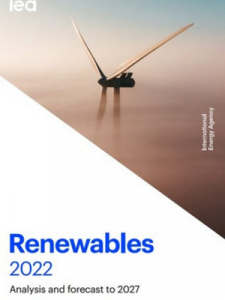In December, the International Energy Agency (IEA) – the leading intergovernmental organization that provides policy recommendations, analysis and data on the global energy sector – released its Renewables 2022 Analysis. The report is available for use by countries looking at cases to accelerate their transition to net zero.
 Renewables 2022 includes analysis on the renewable energy sector, including developments and trends for transportation, including increasingly ambitious energy targets in the European Union (EU), growth in ethanol consumption in Brazil, biofuel blending in India and global feedstock availability to meet the rise of sustainable aviation fuel (SAF), many topics on which the U.S. Grains Council (USGC) provided review and comment in the run up to its publication.
Renewables 2022 includes analysis on the renewable energy sector, including developments and trends for transportation, including increasingly ambitious energy targets in the European Union (EU), growth in ethanol consumption in Brazil, biofuel blending in India and global feedstock availability to meet the rise of sustainable aviation fuel (SAF), many topics on which the U.S. Grains Council (USGC) provided review and comment in the run up to its publication.
“In this most recent IEA report, total global biofuel demand is estimated to increase more than 20 percent between 2020 and 2027, and world ethanol consumption is projected to rise in an accelerated case scenario,” said Isabelle Ausdal, USGC manager of global ethanol policy and economics. “This reinforces the U.S. industry’s recognition of ethanol’s importance as a tool for countries to accelerate their greenhouse gas (GHG) emission reductions and underscores the importance of scaling up technologies such as carbon capture, utilization and storage (CCUS) to reach net zero carbon intensity.”
According to IEA’s report, ethanol consumption in Europe is expected to remain steady at 2021 levels, with the most significant growth in the United Kingdom (U.K.) where consumption is projected to expand by more than 50 percent to meet its Renewable Transport Fuel Obligation (RTFO) and national E10 blending. Recognition was also given to the U.K., Finland and the Netherlands for national E10 blending and the increase in popularity of flex fuel vehicles in France.
While remaining steady in the EU, increased ethanol consumption is forecasted to occur largely in emerging economies aiming to reduce oil imports and boost local economies, while also helping to reduce GHG emissions. IEA projects overall demand for biofuel in Brazil to expand by 40 percent between 2022 and 2027, with ethanol accounting for 70 percent of this change. This is attributed to Brazil’s ethanol mandate, discretionary blending, RenovaBio program and increasing gasoline demand.
Grain-based ethanol production capacity in India is currently not adequate to supplement sugar-based ethanol to meet demand and IEA predicts it will meet only E12 using exclusively domestic production within the next few years. Otherwise, IEA forecasts that India will meet its E20 demand in an accelerated scenario through expanding grain-based ethanol production capacity, allowing imports and addressing vehicle compatibility issues. India estimates grain-based ethanol will provide 46 percent of its supplies by 2025 or 2026.
As demand increases at the country level, global demand for SAF also increases. Due to this boom in aviation demand, IEA expects the world will see a feedstock crunch. Additional pressure will be added as the EU extends limits on the number of eligible supplies. Ethanol was highlighted as a viable feedstock in SAF production to backfill the soaring demand for wastes, oils and fats. The U.S. was identified as the country with the most significant growth potential for SAF production, assuming policies will favor SAF over renewable diesel.
“Policies are the main drivers of biofuel and renewable energy use. With consistent and progressive implementation, IEA’s accelerated scenarios can help countries expedite their progress to meet their 2030 climate targets and beyond,” Ausdal said. “The IEA is a global policy force in the movement toward a net-zero energy future. We greatly value their insights and partnership in contributing to a report so widely respected. The Council looks forward to continued collaboration and the representation of ethanol in the renewable energy future.”
About The U.S. Grains Council
The U.S. Grains Council develops export markets for U.S. barley, corn, sorghum and related products including distiller’s dried grains with solubles (DDGS) and ethanol. With full-time presence in 28 locations, the Council operates programs in more than 50 countries and the European Union. The Council believes exports are vital to global economic development and to U.S. agriculture’s profitability. Detailed information about the Council and its programs is online at www.grains.org.
